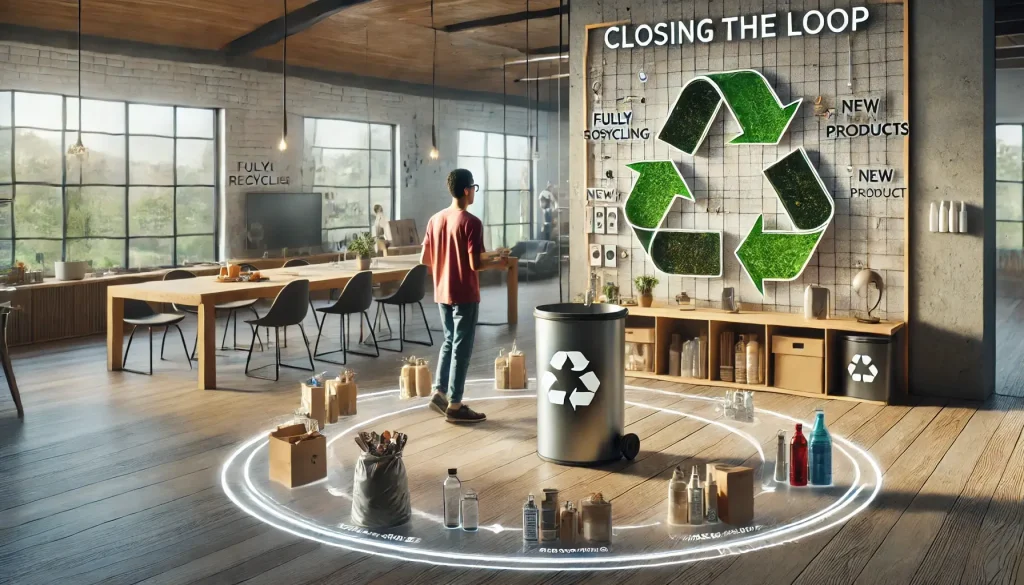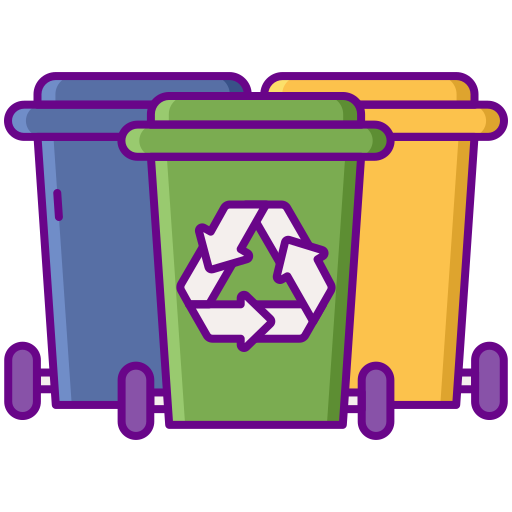In un mondo che punta alla sostenibilità, il concetto di riciclo come processo continuo sta trasformando il modo in cui gestiamo i rifiuti e conserviamo le risorse. Il riciclaggio non è un evento unico, ma un sistema continuo che completa un ciclo completo. ciclo di raccolta, lavorazione e riutilizzo. Noi di Eu Setor ci impegniamo a esplorare strategie innovative per mantenere attivo questo sistema, assicurando che ogni materiale riceva una nuova vita e riducendo al minimo i rifiuti.

Indice
Comprendere il processo di riciclaggio
Il riciclaggio è un percorso continuo che prevede la raccolta, la lavorazione e la reintegrazione dei materiali nella produzione. Questo processo non solo preserva le risorse naturali, ma riduce anche in modo significativo il consumo di energia e le emissioni di gas serra.
Fasi chiave del processo
- Collezione: Il riciclaggio inizia con la raccolta dei rifiuti attraverso programmi comunitari, centri di raccolta e sistemi di raccolta intelligenti che assicurano la separazione dei materiali riciclabili alla fonte.
- Smistamento e lavorazione: Le tecnologie avanzate, come i sistemi robotici automatizzati, i sensori IoT e l'analisi dei dati, identificano e separano i diversi materiali, assicurando che ogni elemento venga lavorato in modo efficiente.
- Produzione e rigenerazione: I materiali riciclati vengono reintrodotti come materie prime per nuovi prodotti, prolungandone la durata attraverso la rigenerazione e riducendo la necessità di nuove materie prime.
- Distribuzione e consumo: I prodotti ecologici realizzati con materiali riciclati rientrano nel mercato e, una volta terminato il loro utilizzo, vengono nuovamente raccolti per ricominciare il processo.
Questo ciclo continuo assicura che le risorse siano utilizzate al massimo delle loro potenzialità, incarnando l'essenza dell'economia circolare.
Innovazioni tecnologiche per migliorare il riciclo
I moderni processi di riciclaggio si avvalgono di una serie di tecnologie che semplificano le operazioni e garantiscono un recupero efficiente delle risorse.
Ordinamento intelligente e analisi dei dati
- Sensori IoT: I sensori intelligenti installati nei cassonetti e nelle strutture di riciclaggio acquisiscono dati in tempo reale sui flussi di rifiuti. Queste informazioni aiutano a ottimizzare i percorsi di raccolta e a perfezionare i processi di differenziazione, rendendo l'intero sistema più efficiente.
- IA e apprendimento automatico: Algoritmi avanzati analizzano i dati per migliorare l'accuratezza della differenziazione, assicurando che i materiali riciclabili siano classificati correttamente e trattati in modo efficiente.
I progressi del riciclo chimico e meccanico
- Riciclaggio chimico: Tecniche innovative scompongono la plastica nei suoi monomeri originali, che possono essere riformati in prodotti di alta qualità in grado di competere con quelli ottenuti da risorse vergini.
- Riciclaggio meccanico: I progressi dei metodi meccanici migliorano il recupero di metalli, vetro e carta, assicurando che il processo operi con la massima efficienza.
Tracciabilità e trasparenza digitale
- Tecnologia Blockchain: La documentazione di ogni fase del riciclaggio su un libro mastro immutabile aumenta la trasparenza e la fiducia dei consumatori.
- Piattaforme mobili: Le app digitali mettono in contatto i consumatori con i servizi di riciclaggio, forniscono linee guida, tracciano i contributi e offrono premi, stimolando la partecipazione e garantendo che il processo rimanga attivo.
I vantaggi di un sistema di riciclaggio efficiente
Un sistema di riciclaggio solido offre vantaggi significativi in termini ambientali, economici e sociali.
Vantaggi ambientali
- Riduzione dei rifiuti in discarica: Un processo di riciclaggio efficiente sottrae i rifiuti alle discariche, conservando spazio e riducendo l'inquinamento.
- Conservazione delle risorse: Il riutilizzo continuo dei materiali riduce la necessità di nuove risorse prime, proteggendo gli ecosistemi e la biodiversità.
- Efficienza energetica: La lavorazione dei materiali riciclati utilizza meno energia rispetto alla produzione di nuovi prodotti a partire da risorse vergini, con conseguente riduzione delle emissioni di gas serra.
Vantaggi economici
- Risparmio sui costi: Un riciclo efficiente abbassa i costi di produzione riducendo la dipendenza da nuove materie prime.
- Creazione di posti di lavoro: L'industria del riciclaggio genera opportunità di lavoro nella raccolta, nello smistamento, nella lavorazione e nella rigenerazione.
- Innovazione del mercato: Le aziende che integrano i materiali riciclati nella loro produzione ottengono un vantaggio competitivo, attirando consumatori attenti all'ambiente e stimolando la crescita.
Impatto sociale
- Coinvolgimento della comunità: Programmi di riciclaggio efficaci promuovono un senso di responsabilità condivisa e incoraggiano uno stile di vita sostenibile.
- Miglioramento della salute pubblica: La riduzione dei rifiuti e dell'inquinamento contribuisce a creare condizioni di vita più sane.
- Opportunità educative: Le iniziative pubbliche educano gli individui alle pratiche sostenibili, dando alle comunità la possibilità di mantenere attivo il processo.
Strategie per migliorare l'efficienza del riciclo
L'implementazione di strategie complete è fondamentale per mantenere un sistema di riciclaggio solido.
1. Rafforzamento delle infrastrutture
- Strutture moderne: Investire in centri di riciclaggio avanzati con tecnologie di selezione e trattamento all'avanguardia è fondamentale per massimizzare il recupero delle risorse.
- Centri di raccolta locali: La creazione di centri di riciclaggio comunitari facilita la partecipazione dei residenti, garantendo una corretta gestione dei rifiuti a livello di base.
2. Promuovere le pratiche di economia circolare
- Progettazione per la riciclabilità: Incoraggiare i produttori a creare prodotti facili da smontare e riciclare, assicurando che i materiali possano essere riutilizzati in modo efficiente.
- Catene di approvvigionamento a ciclo chiuso: Integrare i materiali riciclati nei processi produttivi, riducendo la dipendenza da nuove materie prime e favorendo la sostenibilità a lungo termine.
3. Migliorare la consapevolezza e la partecipazione del pubblico
- Campagne educative: Avviare iniziative che informino il pubblico sui vantaggi del riciclaggio e incoraggino una partecipazione costante.
- Programmi di incentivazione: I sistemi di ricompensa motivano le persone a riciclare, mantenendo costante il flusso di materiali riciclabili.
4. Sfruttare le tecnologie digitali
- Decisioni guidate dai dati: Utilizzare l'analisi dei dati per monitorare e ottimizzare le operazioni di riciclaggio, garantendo l'efficienza del processo.
- Rendicontazione trasparente: Le piattaforme digitali che forniscono informazioni sulle operazioni di riciclaggio creano fiducia e incoraggiano l'adesione a pratiche sostenibili.
Storie di successo nel mondo reale
Iniziativa di riciclaggio urbano
Una grande città ha integrato sensori IoT e sistemi di selezione guidati dall'intelligenza artificiale nella sua infrastruttura di riciclaggio, aumentando l'efficienza di 40% e riducendo significativamente i rifiuti in discarica. Questo successo dimostra come le moderne tecnologie possano ottimizzare la gestione dei rifiuti e preservare le risorse naturali.
Produzione a ciclo chiuso nell'elettronica
Un produttore di elettronica ha reingegnerizzato il proprio processo produttivo per includere materiali riciclati, riducendo la dipendenza da risorse vergini di oltre 60%. Questa innovazione non solo ha permesso di risparmiare sui costi, ma ha anche migliorato la sostenibilità ambientale grazie a un processo di riutilizzo continuo.
Centro di riciclaggio comunitario
In un'area suburbana, i centri di riciclaggio locali hanno aumentato la partecipazione attraverso programmi educativi e l'impegno digitale, dimostrando come gli sforzi della base possano gestire efficacemente i rifiuti e conservare le risorse.
Direzioni future per il riciclo sostenibile
Con l'evoluzione della tecnologia e dei valori sociali, il futuro del riciclaggio riserva progressi promettenti che miglioreranno ulteriormente la conservazione delle risorse.
Tecnologie emergenti
- IA e IoT di nuova generazione: I continui progressi ottimizzeranno ulteriormente il recupero dei materiali e l'efficienza operativa.
- Processi chimici innovativi: I progressi nel riciclaggio chimico consentiranno di riutilizzare in modo efficiente materiali più complessi.
- Scienza dei materiali avanzati: La ricerca sui materiali biodegradabili e biobased integrerà i metodi di riciclaggio tradizionali e ridurrà ulteriormente l'impatto ambientale.
Collaborazione globale e supporto alle politiche
- Standard internazionali: Lo sviluppo di standard globali di riciclaggio armonizzerà le pratiche a livello mondiale, garantendo la sostenibilità oltre i confini.
- Partenariati pubblico-privati: Il rafforzamento delle collaborazioni tra governi, imprese e comunità porterà a ulteriori progressi nel riciclaggio sostenibile.
- Empowerment del consumatore: Con l'aumentare della consapevolezza, la domanda di prodotti ecologici da parte dei consumatori continuerà a spingere l'innovazione e l'efficienza delle operazioni di riciclaggio.
Conclusione: Abbracciare un futuro sostenibile
Un sistema di riciclaggio efficiente è una pietra miliare della sostenibilità ambientale e svolge un ruolo fondamentale nella conservazione delle risorse naturali e nella costruzione di un futuro resiliente. Abbracciando le tecnologie innovative, promuovendo la partecipazione del pubblico e favorendo un'economia circolare, possiamo garantire che i materiali rimangano nel ciclo di vita dei cittadini. ciclo delle risorse piuttosto che diventare rifiuti. Un sistema ben strutturato ciclo di riciclaggio non solo minimizza l'overflow delle discariche, ma riduce anche la richiesta di materie prime, diminuendo l'impatto ambientale e il consumo energetico.
A Eu SetorSiamo impegnati in pratiche ecologiche all'avanguardia che consentono ai processi di riciclaggio di funzionare senza intoppi, trasformando i rifiuti in una risorsa rinnovabile e garantendo che i materiali completino un ciclo completo di vita. ciclo di vita di utilizzo, recupero e riutilizzo. Il nostro impegno va oltre la riduzione dei rifiuti; miriamo a ottimizzare l'intero processo di produzione dei rifiuti. ciclo di riciclaggiorendendola più efficiente, accessibile e d'impatto. Migliorando i metodi di raccolta, perfezionando le tecniche di selezione e integrando tecnologie di elaborazione avanzate, contribuiamo a estendere l'offerta di prodotti e servizi di ricerca. ciclo del prodotto e massimizzare il valore dei materiali riciclabili.
Vi invitiamo a unirvi a noi in questo viaggio di trasformazione, a esplorare strategie di riciclaggio avanzate e a contribuire a un futuro in cui ogni materiale viene continuamente riutilizzato all'interno di un sistema sostenibile. ciclo delle risorse. Lavorando insieme, possiamo costruire un futuro in cui nulla vada sprecato e ogni oggetto scartato trovi un nuovo scopo.
Per ulteriori approfondimenti, guide dettagliate e ispirazioni sulle pratiche di riciclaggio sostenibile, visitate il nostro sito web all'indirizzo eu.setorreciclagem.com.br e diventare parte del Eu Setor comunità. Insieme, abbracciamo il potere del riciclaggio, rafforziamo la ciclo circolare di materiali e costruire un futuro più verde e sostenibile per tutti.
